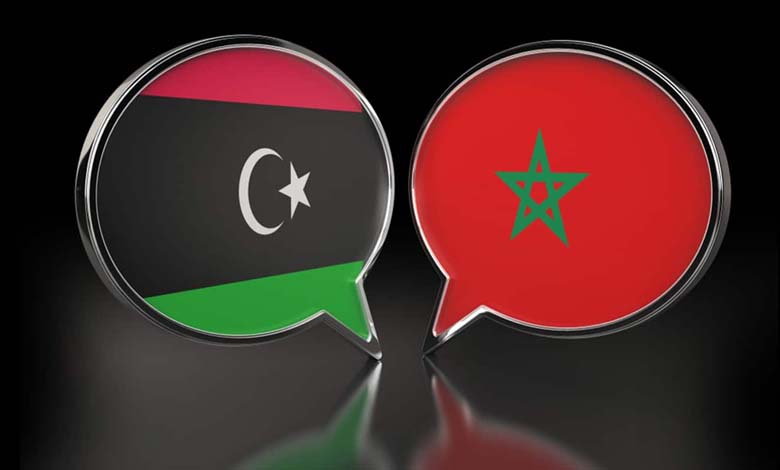A balanced and influential Moroccan role in pushing for a solution to the Libyan political crisis
Rabat supports Bathily with a calm approach based on trust and helping Libyans themselves to find a solution to their problems away from external intervention

Morocco bears the responsibility of promoting Libyan reconciliation and reaching a “peaceful and moderate” solution that satisfies all parties. Moroccan diplomacy is making significant efforts in this regard through intensive meetings with Libyan and international actors to overcome differences.
Morocco has played several decisive roles in resolving the Libyan crisis from its inception, hosting numerous rounds of dialogue between Libyan factions, from the Skhirat agreements to the Bouznika consultations, and overseeing the work of the joint Libyan committee “6+6” to prepare electoral laws last June. These efforts were praised internationally, highlighting Morocco’s important role.
Moroccan Foreign Minister Nasser Bourita emphasized in a joint press conference with the UN Secretary-General’s Special Envoy to Libya, Abdullah Bathily, that the instructions from King Mohammed VI are clear to support all Batley’s efforts to lead Libya out of the institutional crisis it has been suffering from for years.
Bourita noted that Morocco renews its support and assistance to Bathily, following a calm approach based on trust and helping Libyans themselves find a solution to their problems. He emphasized the credibility and trust Bathily enjoys with all Libyan factions, indicating that his listening approach and bridging differences towards holding presidential and legislative elections can resolve the institutional crisis.
Morocco’s presence in the Libyan file reflects the confidence of regional and UN actors in the credibility of the diplomatic efforts led by Rabat in Libya. Morocco’s role underscores its steadfast commitment to supporting the transition to democracy in Libya and establishing a cohesive political model based on a solid constitutional foundation.
Bourita stressed that Morocco always considers elections the most appropriate solution to this institutional crisis, and these elections should mark the beginning of a new stage for Libya, characterized by stability, legitimacy, and responsiveness to the requirements of the Libyan people.
Participation in consultations is a continuation of the milestones in which Morocco has been involved since convincing Libyan factions of the need to seek a political solution to the Libyan crisis. The Skhirat Agreement, which is the main reference, has been developed to lead Libya out of its dark tunnel.
Morocco aims to bridge the gap between Libyan factions without interfering in their affairs. Bourita confirmed that Morocco is prepared to support the dynamics that Bathily wants to initiate to complete the legal framework existing in political and institutional agreements. This will usher in the implementation phase of agreements and lead to holding elections.
Bourita‘s statements are part of Rabat’s consistent position that any solution to the Libyan crisis must be within a Libyan-Libyan framework, away from foreign interventions and through peaceful means under UN auspices, not a military solution at all. Morocco emphasizes that Libyans alone have the legitimacy to choose those who manage their public and political affairs through fair parliamentary and presidential elections, and the solution to the Libyan crisis must be within the framework of Libya’s full sovereignty and unity.
Bourita emphasized his country’s readiness to support and accompany Bathily in advancing the political process in Libya, expressing hope that all related ideas will be translated into initiatives, agreements, and solutions that lead to holding elections.
Bathily, on his part, praised Morocco’s role in the success of the Libyan dialogue, especially the kingdom’s commitment to the success of the electoral process. He said, “We are grateful for the results achieved thanks to Morocco’s support, and we seek the continued support of the kingdom for this political process because we are in the process of activating election-regulating laws and related agreements.”
He added that “monitoring the implementation of these laws in a country experiencing tension and conflict like Libya necessitates reaching agreements based on good intentions among the main parties,” emphasizing the need to reach consensus solutions within the nearest deadlines “because the current situation is unsustainable and entails major risks.”
The UN envoy called on Libyan factions to attend a meeting in the near future to settle disputes regarding elections, in a new initiative aimed at bringing together influential parties leading the country’s main institutions.
After addressing Libya’s position in a regional context marked by tension, Bathily highlighted that the Libyan people and the international community as a whole look forward to establishing peace in this country. He pointed out the repercussions of this tension on security in the region and the world, considering Libya’s geopolitical location.
The UN mission to Libya stated on Thursday in a statement published on its website that Bathily “issued invitations to the main institutional parties in Libya to participate in a meeting to be held in the coming period to reach a political settlement on the political issues and those related to the implementation of the electoral process.”
The institutional parties referred to are the Presidential Council, the House of Representatives, the High Council of State, the Government of National Unity, and the General Command of the Libyan National Army led by Khalifa Haftar. These are the main parties standing on opposing sides with deep disagreements and power struggles.












